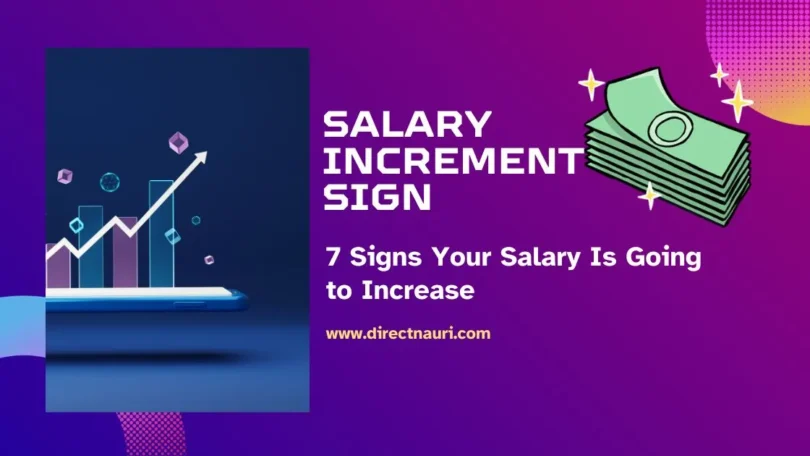Have you ever wondered if your hard work and dedication will pay off in the form of a salary increase? It’s a common concern among employees, as everyone wants to be fairly compensated for their efforts.
Well, worry not! In this article, we will explore the seven signs that indicate your salary is on the path to increase. So grab a cup of coffee, sit back, and let’s dive into the exciting world of salary increments!
1. Consistently Excellent Performance
Excellence is always recognized in the workplace, and it often leads to financial rewards. If you consistently exceed expectations, deliver high-quality work, and demonstrate your commitment to your role, it’s a sure sign that your salary is likely to increase.
When your contributions are consistently noticed and praised, employers are more inclined to reward your efforts and invest in your professional growth.
For Example:
Imagine you’ve consistently met or exceeded your targets for the past year. Your supervisor regularly acknowledges your exceptional performance, and your colleagues often seek your guidance.
These are clear indicators that your employer values your contributions and is likely to reward you with a salary increase.
2. Increased Responsibilities
When you find yourself taking on more responsibilities at work, it’s often a positive sign of career growth and, subsequently, a higher salary.
As you demonstrate your capability to handle additional tasks and responsibilities, you become an invaluable asset to your organization.
This increased level of trust and dependence on your abilities creates a strong case for a salary increment.
If you also thinking that your salary is going to increase then must aware about the advantages and disadvantages of salary increment, this will help you to know about the pros and cons of salary increase
For Example:
Let’s say you were initially hired as a junior analyst. Over time, you gradually took on additional responsibilities such as leading projects, training new team members, and making critical decisions.
This expansion of your role indicates that you are valuable to your organization, and a salary increase becomes a justifiable reward for your expanded contributions.
3. Recognition and Praise from Superiors
Positive feedback from your superiors is not only a great motivational boost but also an indicator that your salary might be heading in the right direction.
When your managers and supervisors consistently express their satisfaction with your work and recognize your achievements, it demonstrates that you are making a significant impact within the company.
Such recognition often goes hand in hand with salary increments.
For Example:
Imagine receiving an email from your manager praising your innovative ideas and outstanding performance on a recent project.
Additionally, your manager nominates you for an employee of the month award. These acknowledgments directly reflect your value to the company and increase the likelihood of a salary increase.
4. Internal Pay Scale Adjustments
Organizations periodically review and adjust their internal pay scales to ensure fair compensation for employees based on market standards and industry benchmarks.
If you notice your company making pay adjustments or implementing new salary bands, it could indicate that your salary is due for an increase.
Stay informed about your organization’s compensation policies and keep an eye out for any updates or changes.
For Example:
You come across an internal memo stating that your organization has initiated a review of its compensation structure to align it with industry standards.
This review signals the company’s commitment to fair pay practices and increases the chances of a salary adjustment for you and your colleagues.
5. Market Demand for Your Skills
Supply and demand are fundamental factors in determining the value of goods and services, and the job market is no exception.
If you possess rare or in-demand skills that are highly sought after in your industry, you have a strong bargaining position when it comes to negotiating your salary.
Employers are more likely to offer higher compensation to retain employees with specialized expertise. Furthermore, there are various salary growth tips which can help you in increment on your salary.
For Example:
Let’s say you’re a software developer specializing in a programming language that is experiencing a surge in popularity.
Companies are actively seeking professionals with your skillset, and recruiters frequently approach you with job opportunities.
This high demand for your expertise gives you leverage to negotiate a higher salary or even receive offers from other companies willing to pay a premium for your talent.
6. Promotions and Career Advancement
Promotions and career advancement often come hand in hand with salary increases. If you have been consistently progressing and moving up the corporate ladder, it’s a clear indication that your salary is on an upward trajectory as well.
As you take on more significant roles and responsibilities within your organization, your compensation should reflect the added value you bring to the table.
For Example:
You joined the company as an entry-level sales representative, and over the years, you’ve been promoted to team lead and then to sales manager.
Each promotion came with a salary increase to recognize your growing expertise and contribution to the company’s success.
This career progression ensures that your salary remains in line with your increasing responsibilities.
7. Open Discussions with Your Employer
Transparent and open communication with your employer is essential in understanding expectations, goals, and potential salary increments.
If your employer proactively initiates discussions about your professional growth, seeks your input on salary expectations, or outlines a clear roadmap for your future within the organization, it’s a strong sign that they are willing to invest in your growth, both personally and financially.
For Example:
During your performance review, your manager engages in a detailed conversation about your career aspirations and asks about your long-term plans with the organization.
They inquire about your salary expectations and emphasize their commitment to your professional development.
These discussions lay the groundwork for potential salary increases as the company values your dedication and wants to retain you.
Conclusion
In conclusion, there are several signs that strongly suggest your salary is on the path to increase. Consistently excellent performance, increased responsibilities, recognition from superiors, internal pay scale adjustments, market demand for your skills, promotions, and open discussions with your employer all indicate promising prospects for a salary increment.
Remember, your hard work and dedication deserve to be rewarded, so keep striving for excellence, communicating effectively, and pursuing growth opportunities. By doing so, you are setting yourself up for financial success and a brighter future.
FAQs
What are common indicators that my salary might increase?
Look out for positive performance reviews, increased responsibilities, and industry trends that suggest upward salary adjustments.
How do I approach the topic of a salary increase with my employer?
Choose the right timing, prepare a compelling case highlighting your contributions, and be open to negotiation.
Is it appropriate to ask for a raise if I feel my salary is not enough to cover living expenses?
Absolutely. Communicate the financial challenges you’re facing and provide data supporting your request for a fair and livable wage.
Are there specific signs in my job that indicate a salary increase is imminent?
Yes, such signs may include company growth, positive financial performance, and your consistent contributions to the organization.
How can I determine if I am being paid fairly for my role?
Use salary comparison tools, industry benchmarks, and company salary data to assess if your current pay aligns with market standards.
Is there a formal way to request a salary increase from my employer?
Yes, consider drafting a well-researched salary increase letter outlining your achievements, responsibilities, and reasons for the request.
What role does job satisfaction play in the likelihood of a salary increase?
Job satisfaction often correlates with increased productivity, making you a stronger candidate for a salary boost.







